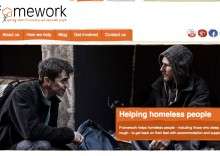Campaign Summary
THE CASE FOR ACTION

There is a strong financial case for action – apart from the moral argument. The problems faced by people living troubled lives affect all of us economically and socially. For instance:
THE EVIDENCE IS IN

Extensive research – particularly the recently published Hard Edges report by the LankellyChase Foundation – has described the challenges faced by people living troubled lives. Programmes like the Big Lottery Fund Fulfilling Lives programme and the government’s Troubled Families programme provide a template for what to do.
The Coalition Government announced plans for a Troubled Lives programme in the 2014 Autumn Statement and the 2015 Budget, but a Troubled Lives programme alone will not solve the problem.
Based on its extensive front-line experience, Framework is proposing five simple and specific actions which would make a Troubled Lives programme effective and prevent people requiring such intensive support in the future. The actions are simple because they build on existing policy and practice.
Support people living troubled lives
The Troubled Families programme and the Big Lottery Fund’s Fulfilling Lives programme are both good models of effective intervention. It is proposed that central Government should utilise these in a new Troubled Lives programme targeting those individuals with the greatest number and complexity of needs – around 60,000 people identified by recent research.
Amend the rules on social and health care
In theory, people who need support or care are entitled to receive it from their local authority. In reality, homeless people and others with two or more interacting needs find themselves excluded from the assessment process that should lead to an offer of help.
specialist housing For those who need it
Specialist supported housing is chronically underfunded but is essential in enabling people with support needs to live in the community.
Not everyone in this group requires specialist housing but for the minority who do it is hard to find. The available stock is reducing. Ongoing lack of investment affects the quality of what remains.
Make welfare work for people living troubled lives
People living troubled lives due to multiple and complex needs are rarely in paid work. Some may sustain a part-time job, a volunteer placement or participation in training. The benefit system should encourage whatever contribution they can make to the community.
The Skills Funding Agency is asked to resource capacity and confidence building as well as basic skills for this group.
Join up policy where it affects people living troubled lives
Some departmental decisions can have unforeseen and unintended consequences. A current example is the Review of Exempt Accommodation being undertaken by IPSOS Mori for the Department for Work and Pensions (DWP).
The potential impact on those who live in supported housing has knock-on implications for other departments in particular the Department for Communities and Local Government, the Department of Health, the Ministry of Justice and the Cabinet Office.
Please show support by leaving your email address
Tweet us
Like us on facebook
Unable to display Facebook posts.
Show error
Type: OAuthException
Code: 190
Please refer to our Error Message Reference.
